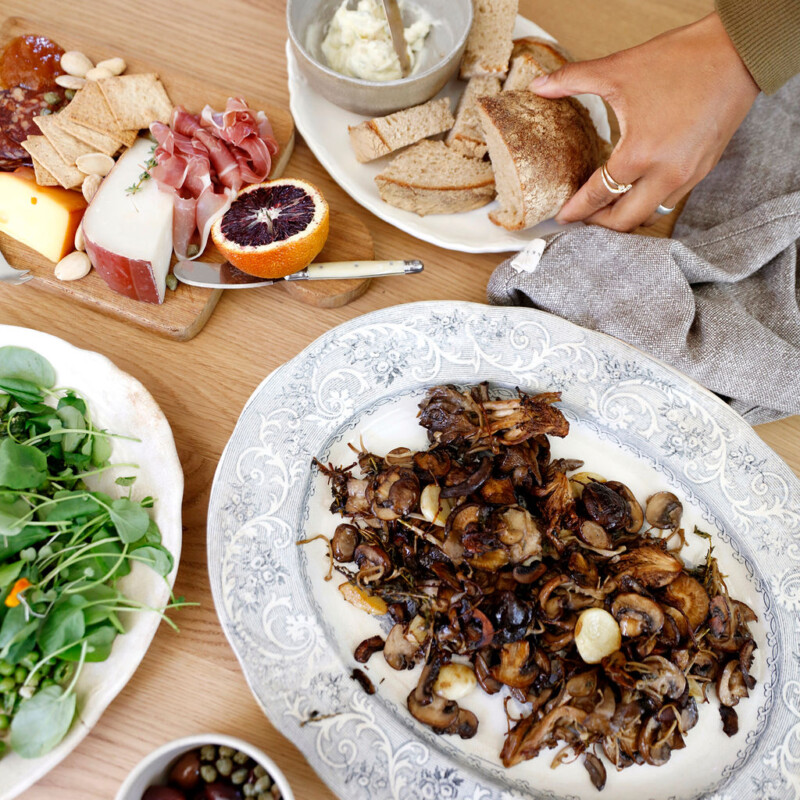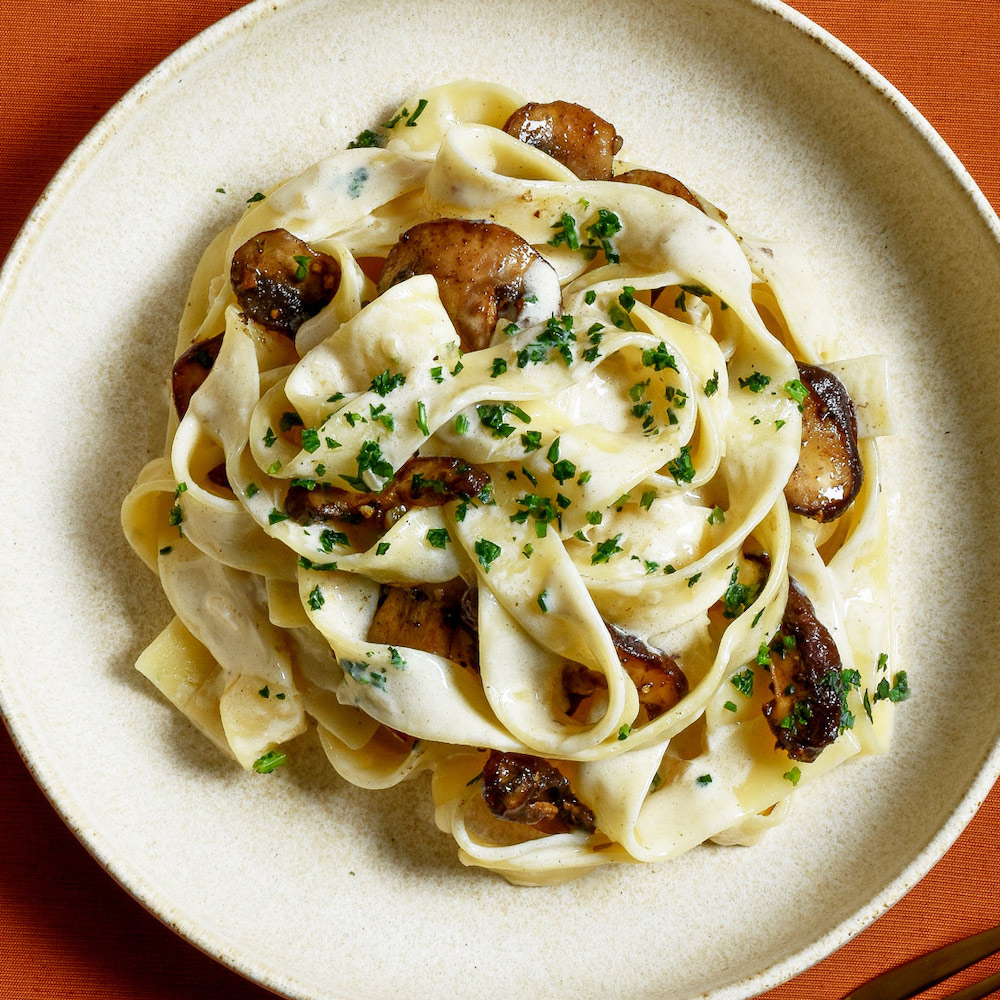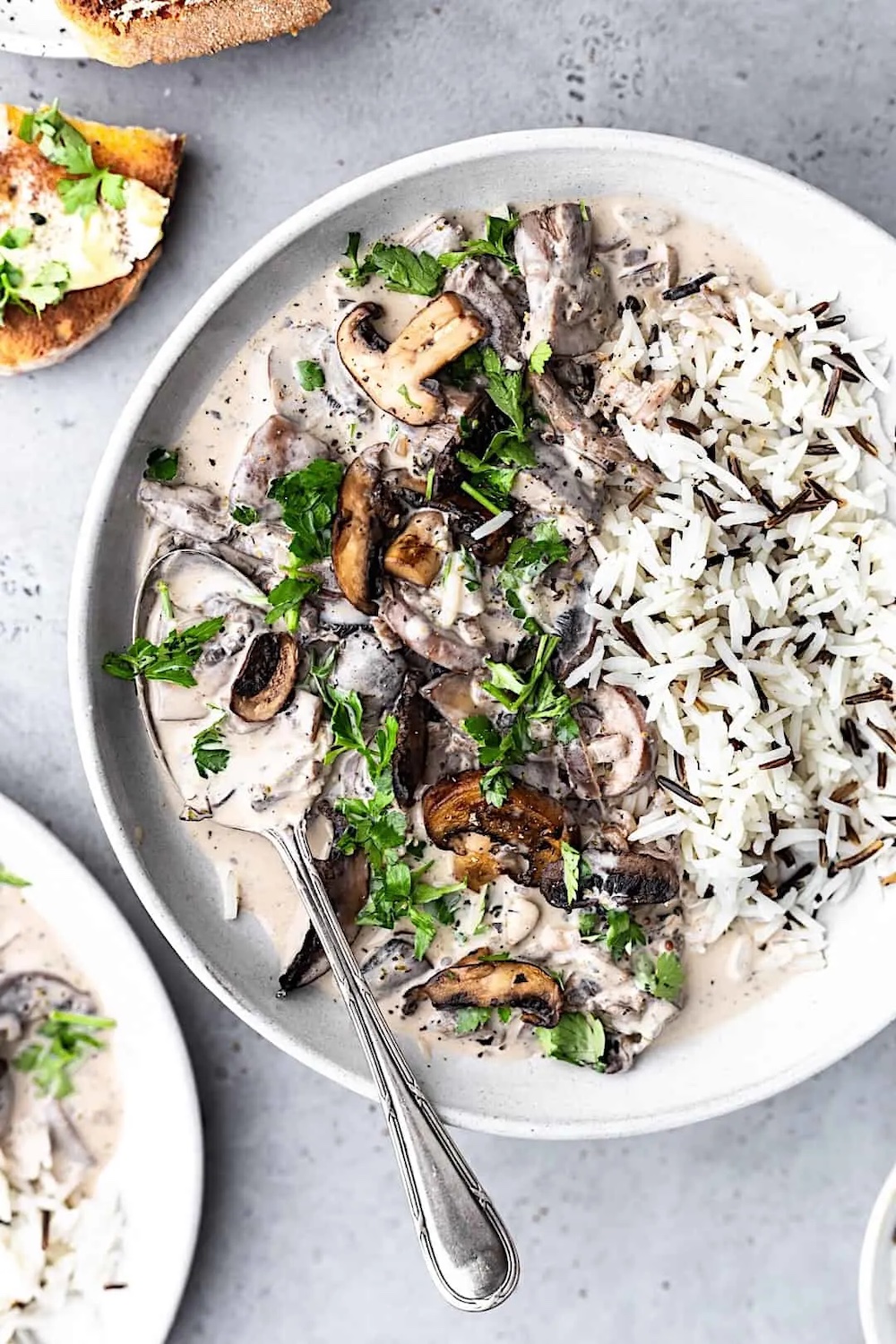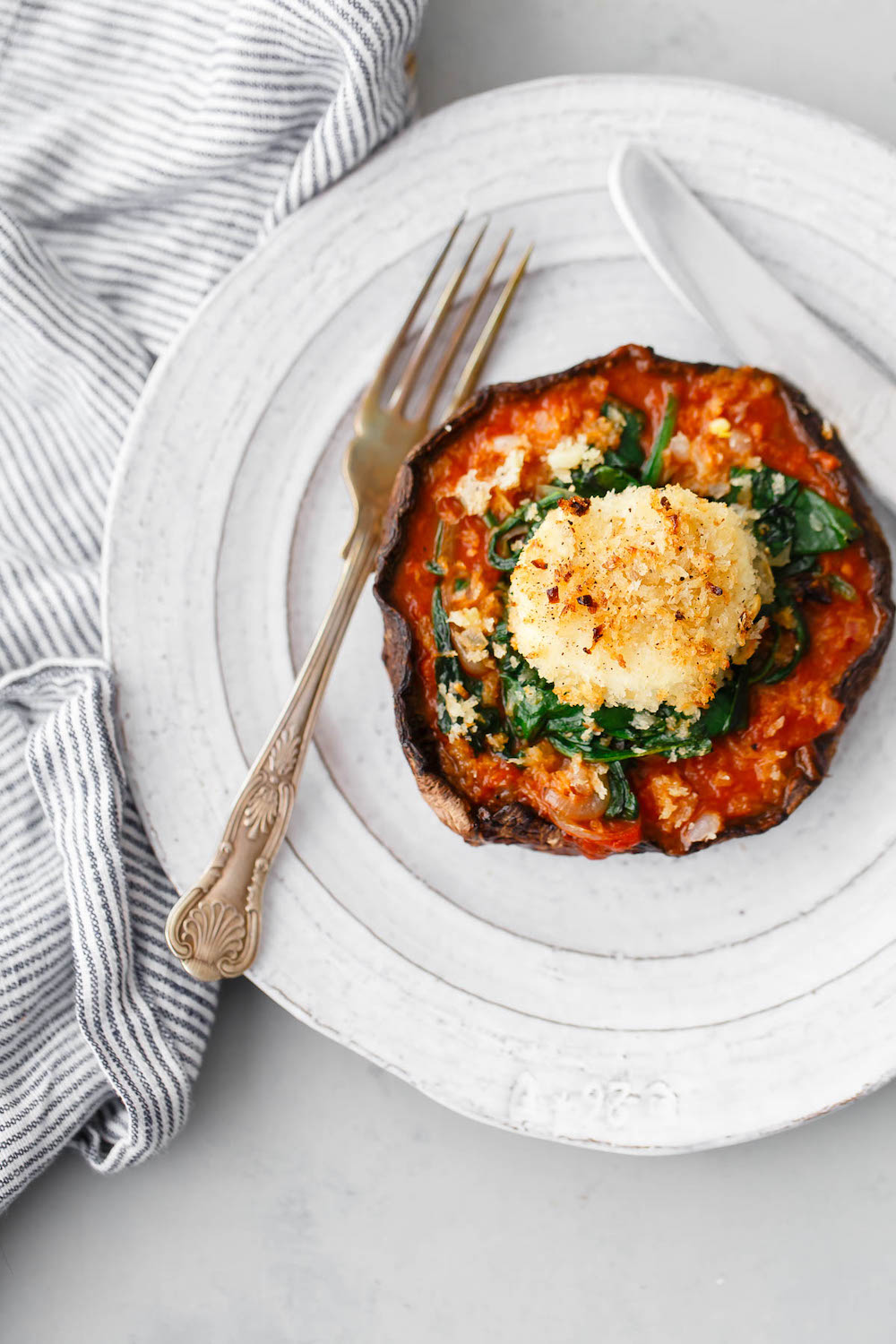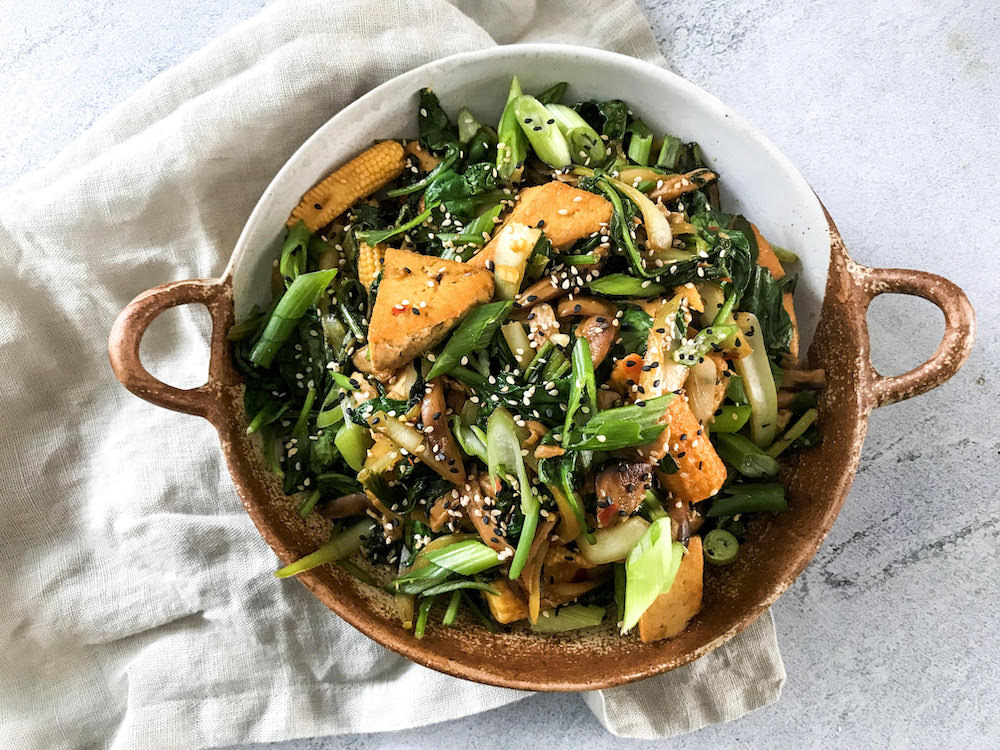Mushrooms—you either love ’em or hate ’em. We’re a divided house (I love them), so I’m often sneaking them into our dinners because there are so many health benefits of mushrooms. My secret weapon? A food processor. Blending mushrooms with herbs and salt works wonders. Then I add the paste to homemade burgers and pasta sauce, which masks what some find to be a spongy texture and bland flavor. Otherwise, I make this fool-proof mushroom recipe: thinly slice white button mushrooms, toss them into a pan with butter, and sauté them until browned. Add fresh thyme. Generously pour dark cooking wine (like a sherry) and soy sauce into the pan. Let the liquid reduce. Sprinkle with sea salt, and et voila—maybe I can convince you to eat mushrooms after all.
While I’m not here to turn you into a mushroom lover, the health benefits speak for themselves. Even consuming them every-so-often is beneficial. They’re packed with a ton of essential vitamins and minerals, along with fiber, protein, and antioxidants. Mushrooms have long been recognized as a healthy part of any diet, helping mitigate the risk of various health conditions. So, let me explain…
What Are Mushrooms?
Although mushrooms are classified as vegetables, they’re not technically plants. They’re part of the kingdom called fungi. Mushrooms are types of fungi that have a “plantlike” form with a stem, cap, and cell walls. If you think of them like plants, they’re akin to the fruit of a plant. Rather than producing seeds, mushrooms produce millions of microscopic spores underneath the cap (in the gills). The beauty of mushrooms is that they come in a variety of shapes, sizes, colors, and textures. The health benefits of mushrooms pack a powerful punch and for cooking purposes, they’re lumped into the vegetable category, adding flavor in many global cuisines.
Functional Vs. Culinary Mushrooms
We’re not diving into the hallucinogenic variety today, but there is a difference between functional and culinary mushrooms. Although all mushrooms are functional, there are certain kinds of mushrooms that are touted for their medicinal effects. Medicinal mushrooms, also known as functional or adaptogenic mushrooms, have the potential to support our health in more significant ways than your traditional portobello.
Adaptogenic mushrooms may help reduce the effects of stress on your body. Quite literally, they adapt to your body’s needs. In essence, they work to bring your body back to homeostasis. From improving cognitive function to supporting the immune system, mushrooms like reishi, chaga, cordyceps, and lions mane are making waves in the wellness industry. In fact, the functional mushroom market is forecasted to hit over half a trillion dollars by 2028.
That said, they’re not new. East Asian medicinal traditions have understood the health benefits of mushrooms and used functional mushrooms for hundreds of years. As they continue to gain popularity, you can find high-quality adaptogens added to coffee, protein powders, tinctures, and more. There are so many ways to add functional mushrooms to your daily routine.
Are Mushrooms Toxic?
Ever notice wild mushrooms growing in your backyard? Me too. Most likely, they’re toxic. Only about 3% of known mushroom varieties are poisonous, but some wild mushrooms contain high levels of heavy metals and other harmful chemicals. And while wild mushrooms can taste delicious, the toxins in some mushrooms can trigger fatal—but uncommon—health issues. Like, liver failure. Other times, the symptoms of mushroom poisoning can lead to gastrointestinal discomfort. So long as you’re consuming mushrooms from a reliable source (grocery store, farmers market, restaurant, etc.), there’s no reason to worry.
Nutritional Benefits of Eating Mushrooms
Naturally fat-free, low-sodium, and cholesterol-free, mushrooms are packed with micronutrients: Fiber, vitamins, and minerals. While the health benefits of mushrooms and nutritional value vary depending on the type of mushroom you’re eating, they are a substantial source of antioxidants, B vitamins (riboflavin, niacin, etc.), copper, potassium, vitamin D, and selenium. There is research to prove that consuming mushrooms can positively impact our wellbeing.
Mushrooms for Heart Health
For example, the fiber, potassium, and vitamin C in mushrooms may contribute to cardiovascular health. Potassium can also help regulate blood pressure because it lessens the tension in blood vessels. Additionally, mushrooms contain beta glucan, a form of soluble dietary fiber. It’s been strongly linked to improving cholesterol and boosting heart health. It can also help your body regulate blood sugar, reducing the risk of type 2 diabetes. Of all traditional mushrooms, oyster and shiitake mushrooms are believed to have the most effective beta glucans.
Mushrooms for Anti-Aging
According to a team of researchers at Penn State, mushrooms may have anti-aging potential. Because they contain unusually high amounts of antioxidants (i.e. selenium), data indicates that mushrooms are able to neutralize free radicals. And free radicals cause various health conditions, like heart disease and cancer. Because they’re full of antioxidants, they may have anti-aging potential. Plus, all of these antioxidants help boost the immune system.
Mushrooms for Brain Function
“The studies done by many researchers as well as on-going studies show that selected mushrooms do have neurotrophic properties that can be beneficial to humans. Regular consumption may promote nerve and brain health. This is particularly useful during injury (as in an accidents) or as we age” (National Center for Biotechnology Information).
For centuries, mushrooms have been used for medicinal purposes to boost cognitive function. Mushrooms for brain health include the possibility of fighting many types of diseases, including anxiety, depression, and Alzheimers. When it comes to improving brain health, specifically, three medicinal mushrooms help: Cordyceps, reishi, and lion’s mane.
Mushrooms for Bone Strength
Because vitamin D is essential for good bone and muscle health, mushrooms are correlated to strong bones. In fact, researchers from Boston University School of Medicine have discovered that eating mushrooms containing vitamin D2 can be as effective at increasing and maintaining vitamin D levels as taking supplemental vitamin D2 or vitamin D3. In essence, vitamin D helps build and maintain strong bones by helping the body absorb calcium.
Types of Mushrooms
Across the world, there are over 10,000 species of mushrooms. Interestingly, mycologists suspect that this is only a fraction of what’s out there! That said, the most common types are:
- Portobello
- Shiitake
- Crimini
- Oyster
- Enoki
- Truffle
- Porcini
- Maitake
They each have a unique look and taste, along with specific locations where they (naturally) grow. For example, shiitake are very popular in Asian cuisine, with a strong flavor that emanates in stir-fry dishes. Porcini, on the other hand, have a nutty, earthy flavor that is wonderful for pasta dishes. These red-hued mushrooms grow mainly in Europe, and finding dried porcinis is much easier than finding them fresh.
How to Eat Mushrooms
There are many ways to eat mushrooms, and there are countless mushroom recipes on the internet. Mushrooms are recognized by global chefs for their ability to create savory rich flavors (umami), thanks to the presence of an amino acid called glutamate. From roasting to grilling, the sky’s the limit.
How to Properly Clean Mushrooms
So, the best way to clean mushrooms is with a paper towel or washcloth. No need to rinse them or submerge them in water. In fact, excess moisture is not the goal. As you peruse the grocery aisle, make sure to grab mushrooms that are relatively firm, aren’t moist to the touch, and don’t contain mold.
6 Delicious Mushroom Recipes
Whether you’re in the mood for an Italian pasta dish, Japanese-inspired soup, or a hearty veggie burger, mushrooms are essential when it comes to achieving a warm, savory umami (without any meat!).
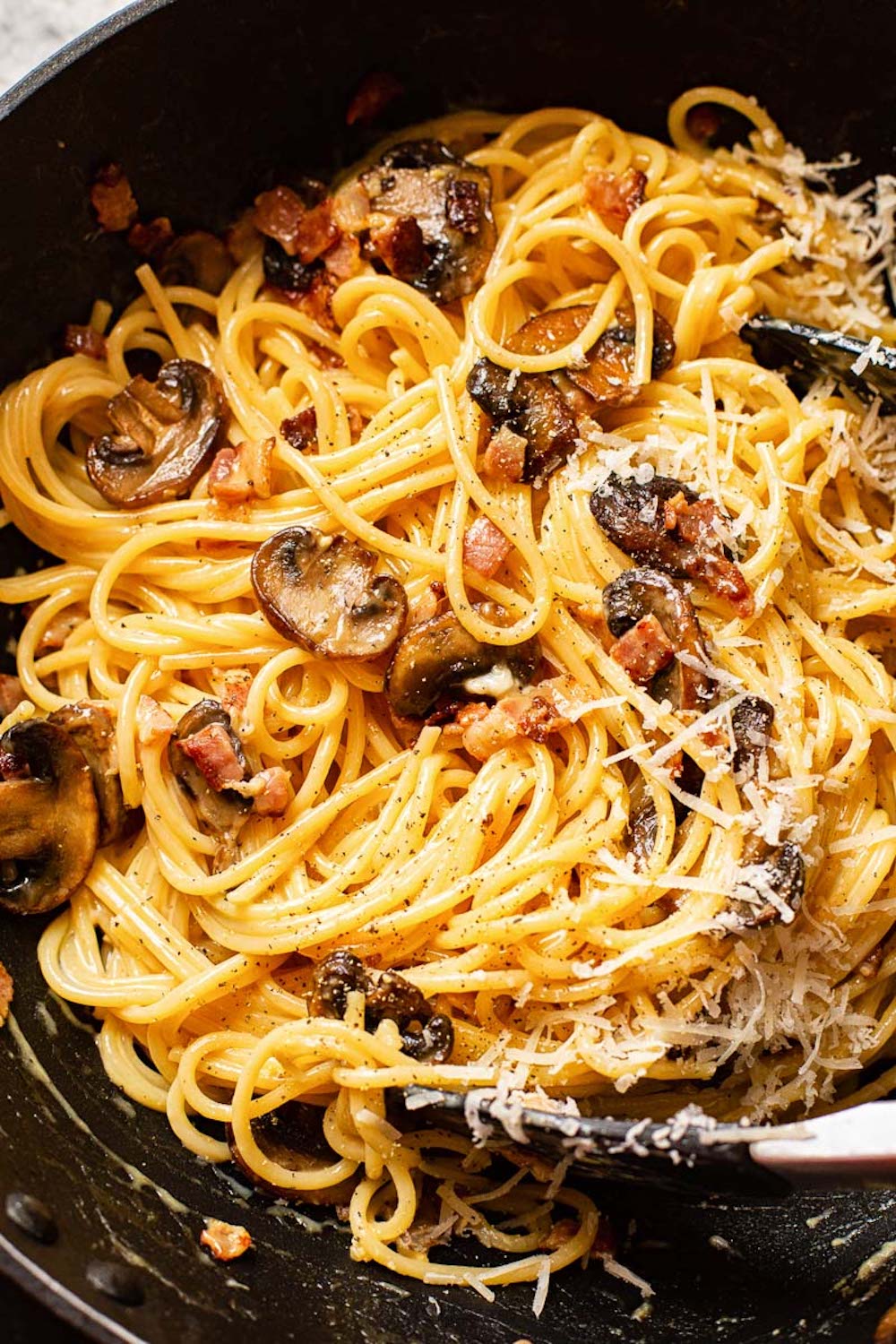
Crimini
Recipe: Mushroom Carbonara by Vinkalinka
With a few simple ingredients, jazz up your traditional pasta carbonara with crimini (or button) mushrooms for a light, quick, and delicious dinner.
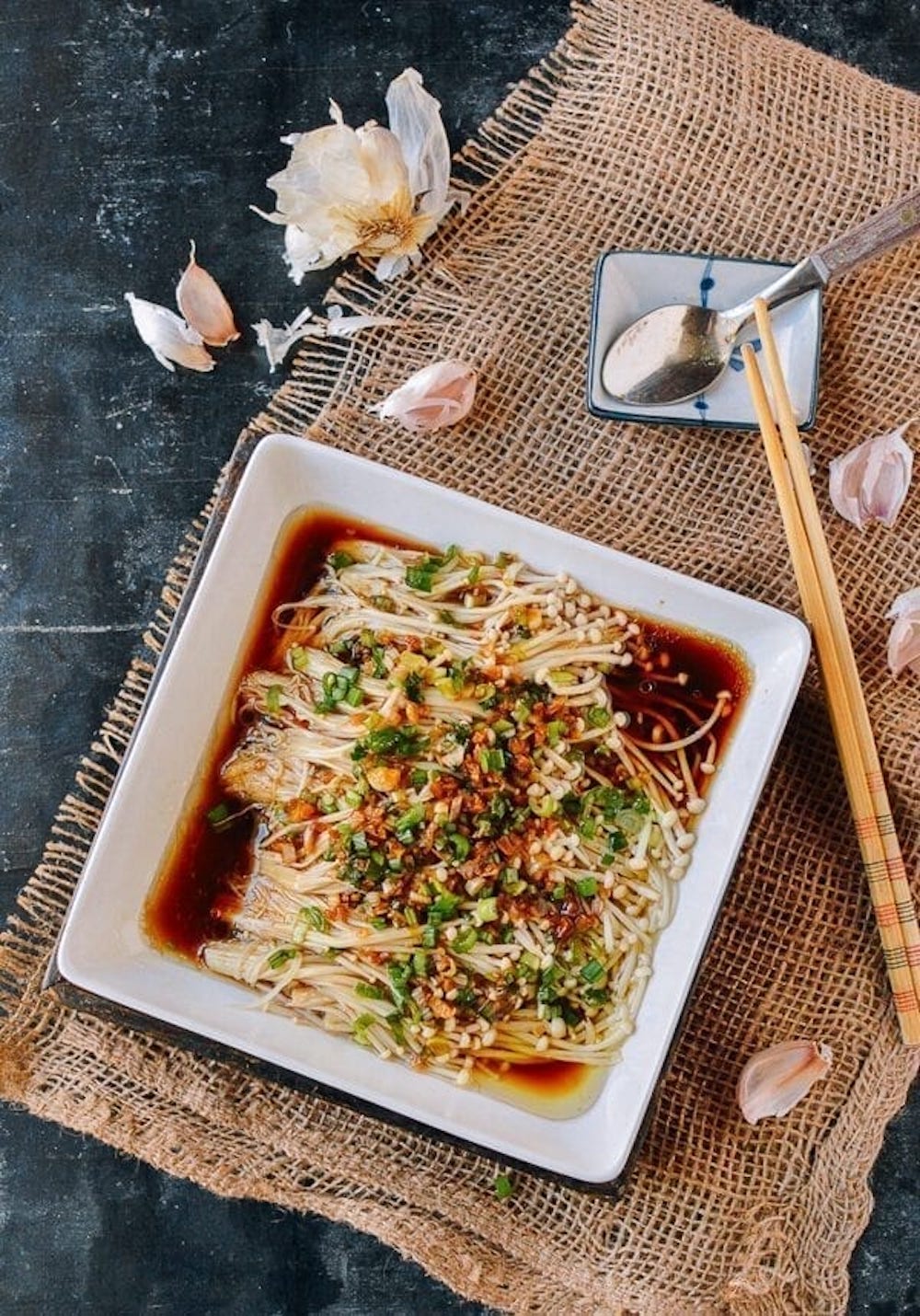
Enoki
Recipe: Enoki Mushrooms with Garlic and Scallion Sauce by The Woks of Life
Fresh enoki mushrooms have finally made it to the mainstream in the U.S/ markets! Chinese call the Japanese named, enoki mushrooms, “golden needle mushrooms,” and this recipe highlights their delicate versatility.
Truffle
Recipe: Truffle and Mushroom Pappardelle by Planted.
A creamy and rich pasta dish—the perfect meal to impress (with minimal effort). It’s a decadent meal for a special date night where you want to show off your cooking skills, without actually needing that many.
Oyster
Recipe: Vegan Mushroom Stroganoff by Cupful of Kale
Can’t do dairy? Try this creamy vegan mushroom stroganoff served with wild rice and garlic bread. You won’t miss the cheese (or the meat).
Portobello
Recipe: Stuffed Portobello Mushrooms with Crispy Goat Cheese by A Beautiful Plate
Stuffed portobello mushrooms topped with marinara, sautéed spinach, and crispy panko goat cheese medallion make for a delicious and easy vegetarian dish.
Shiitake
Recipe: Shiitake Mushrooms with Tofu and Asian Greens by Wandering Wafflehands
A seriously easy midweek meal that is full of flavor. Shiitake mushrooms star alongside crispy tofu, fresh ginger, soy sauce, and spicy sambal oelek.
Did you know about the many health benefits of mushrooms? What’s your favorite recipe? Share it below.

